The
PhotoDrama of Creation
Section 6
King
Belshazzar's Feast
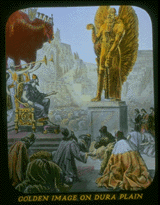
Pride
overbalanced Nebuchadnezzar's judgment, and, in the plain
of Dura, he was led to erect a great image of himself
as Earth's Ruler, to which all people were required to
bow down in obedient reverence! If the people could regard
him as a god, they would be the more sure to obey him.
But among them were three Hebrews who refused to bow the
knee. Their religious scruples were not respected. It
was enough that they were defying Emperor Nebuchadnezzar.
A great furnace was heated seven times, or as hot as possible,
and into it the three servants of God were cast. The men
who threw them in inhaled flame and died. Nebuchadnezzar
and his lords, looking over toward the furnace, saw the
three unhurt and with them One like unto the Son of God.
Nebuchadnezzar acknowledged the God of the Hebrews and
commanded all the people to worship Him. Although God's
people today may be subjected to fiery trials, they will
probably not be literally burned in a furnace. Nevertheless,
God's power can keep their hearts in every trouble.
It
was after this that Nebuchadnezzar became insane and beast-like
lived upon herbage, seven years, after which his reason
was restored and he gave glory to God.
Later
on came Belshazzar's Feast, the handwriting on the wall
and the fall of Babylon, when the kingdom of the Medes
and Persians, represented in the Image by the silver,
and by the Bear in Daniel's vision, took possession of
the dominions once ruled by Babylon. Cyrus' army turned
aside the Euphrates, marched in through the river-bed
and captured the city supposed to be impregnable.
Babylon
is the symbolical name in Revelation for a great Ecclesiastical
System. Its fall is described as accomplished through
the drying up of the symbolical river Euphrates, that
the way of the Kings of the East might be prepared--a
Royal Priesthood, of which Christ is the Head. The river
represents people and wealth.--Revelation 17:15.
King
Darius and Cyrus
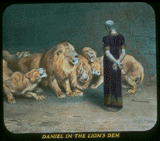
Daniel
the Prophet ranked high with King Darius for his integrity.
His associates hated him because he prevented graft. They
knew of no way to get hold of Daniel except on account
of his religion. They urged upon King Darius the influence
that would accrue from announcing himself the only one
to be worshiped. They urged that this would impress the
people, make them more loyal to his government. They got
a decree issued that anybody worshiping any other god
than Darius should be thrown into a den of lions. Then
they spied upon Daniel and convicted him. It was a Medo-Persian
law that royal decrees could never be ignored. Hence,
although King Darius was very sorry to know of his most
faithful officer being caught, he was unable to change
the arrangement. His only hope was that Daniel's God might
do something for his deliverance.
Daniel
was cast into the den of lions, but in the morning was
brought forth safe. Then those who had thus entrapped
him, by the King's command were cast into the den of lions,
the same as Daniel, and devoured.--Daniel 6:14-24.
At
the end of the seventy years of the desolation of Jerusalem,
God stirred up the heart of Cyrus, who then was on the
throne, to issue a proclamation giving liberty to all
Israelites to return to Palestine. He also gave money,
and decreed that the vessels of the Lord's House, which
had previously been taken, should be restored. Approximately
fifty thousand Israelites returned--so few out of the
many taken into captivity. The zealous, full of faith
in the Abrahamic Promise, returned, rebuilt the city,
and, in Ezra's time, the Temple. The others had become
worldly-minded and interested in Babylon. Thus God separated
the dross of Israel to prepare them for Messiah. Yet the
"Israelites indeed" were few compared to the
whole, when their day of visitation came.
The
romantic story of Queen Esther, wife of King Ahasuerus,
follows the period of King Cyrus' decree.
The
Valley of Dry Bones
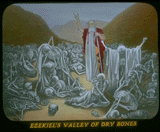
Ezekiel's
vision of the valley of dry bones, which came together,
were clothed with sinews, and then with skin, an exceeding
great army, is supposed to represent the resurrection
of the dead. But this conjecture seems to be erroneous.
The Prophet declares that this picture represents the
revival of Israel's Hopes. First the dry bones of hope,
then sinews of strength, and finally comeliness and completion.
We read, "This is the whole House of Israel, which
say, Our hope [of again becoming a nation] is dried; we
are cut off from our parts."--Ezekiel 37:1-14.
The
fulfilment of this prediction seems to be in progress
now amongst the Jewish people. Only a short time ago they
had no hope; then came Zionism, the dry bones of hope
for amelioration from suffering, but without any faith
in the Abrahamic promise. Later, we see the Jews growing
in trust in the Abrahamic promise and coming together
with strength, wealth and faith. The time is evidently
not far distant when their national hope will be rehabilitated
and they shall rejoice again as a people.--Isaiah 40:1,
2; Romans 11:25-33.
The
Scriptures tell about the resurrection of the dead; that
it will not be the body which dies that will be resurrected.
The body returns to dust. In the morning of Messiah's
Reign, God through Him will grant each of Adam's race
"a body as it hath pleased Him." The saintly
few will share in the First Resurrection, to glory, honor
and immortality, the divine nature, far above angels.
Then will come God's blessing upon the world, to give
them Restitution--earthly bodies. It is manifestly much
easier for God to give as He purposes, a new body, than,
as we once surmised, to gather each atom of dust from
every quarter to restore it as the same body. Not a passage
of Scripture mentions the resurrection of the body, but
many passages mention the resurrection of the soul, which
will be awakened and given a new body, earthly for the
earthly class, Heavenly for the Heavenly class.--1 Cor.
15:37-40.
The
Logos Made Flesh
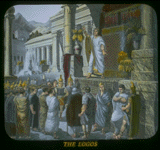
The
Jewish nation, failing to keep the Law Covenant of Sinai,
failed to make good as the Seed of Abraham fit to bless
the world. Then the due time came for God to provide Messiah-Redeemer
and Deliverer for Israel and all peoples. He would become
flesh, of Abraham's family, fulfil the Law Covenant terms,
and then by self-sacrifice would become Abraham's Seed
on the Spirit plane, able to succor all who would come
to the Father through Him.
In
St.John's Gospel (1:1-5) Jesus in His pre-existent condition
is described as the Word of God, or Logos, "The Firstborn
of all Creation."--Colossians 1:15.
Ancient
kings addressing their people sat behind a lattice, in
front of which stood a representative who uttered the
king's message to the people. Such representative was
called the Logos--the king's word, or mouthpiece. The
illustration is forceful, beautiful, when applied to God's
Only Begotten Son, through whom God speaks to humanity--to
the Church now, to the world shortly, through the Messianic
Kingdom.
The
literal translation of John 1:1 throws much light upon
a subject hitherto dark. "In the beginning was the
Logos, and the Logos was with the God, and the Logos was
a God; the same was in the beginning with the God. All
things were made by Him, and without Him was not one thing
made that was made. The Logos was made flesh and dwelt
among us, and we beheld His glory, as the glory of the
Only Begotten of the Father." Jesus tells us the
same thing in other language, saying, "He was the
beginning of the creation of God." (Rev. 3:14.) "He
was the beginning and the ending, the first and the last,
the Alpha and the Omega." (Rev.21:6.) The thought
is clear; Jehovah God directly created no other being
than the Logos, and Him very great and in the likeness
of Jehovah. How distinctly, yet briefly, all this is stated
by St. John!
Next
in the Divine Program was the annunciation to Mary, then,
the greatest event of history, the birth of our Redeemer.
Tidings
of Great Joy
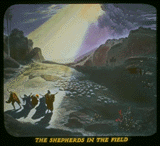
Only
as we associate the Babe of Bethlehem with the Logos by
and through whom all things were made, do we get our mental
focus respecting Jesus. His life was not from Adam, through
Joseph--a forfeited life. It was a transferred life. The
Logos, who was rich in spirit privileges, glory and honor,
"for our sakes became poor [The Man Christ Jesus]
that we by His poverty might become rich"-- that
mankind might be redeemed from the curse--the Death Sentence
and all it includes of sorrow, pain and alienation from
God. "A body hast Thou prepared Me for the suffering
of death!" The death of a spotless One was necessary
as a Ransom-price for Adam and his race.--1 Timothy 2:6.
No
wonder the angels rejoiced to announce to the shepherds
the Logos made flesh--the Babe of Bethlehem. "Fear
not! Behold, we bring you good tidings of great joy, which
shall be unto all people!" Few have analyzed the
Message, few have seen how comprehensive its scope. It
is for Jews and Gentiles--sinners all--"all people."
Only a few have yet had opportunity to get this great
joy; but the Redeemer promises that He will yet be the
True Light to lighten every man that cometh into the world.--John
1:9.
"For
unto you [mankind] is born this day in the City of David
a Savior, which is Christ the Lord." Ah! the meaning
of that word Savior! It means Life-giver! The right to
live had been lost--all are dying. The Life-giver came
to provide life everlasting for the dying race. Thank
God for a Life-giver, a Great One, able to save unto the
uttermost!--Hebrews 7:25.
The
"Peace on Earth, good-will to men" prophecy
has not yet been fulfilled, but it is nearing. The birth
of the Babe was one step toward it; the death on the cross
was another; the glorious resurrection and ascension of
the Logos again to the Spirit plane were other steps.
The selection of the Church as Messiah's Bride is another,
nearly completed. The Messianic Kingdom will complete
the blessed prophecy.
John
the Forerunner
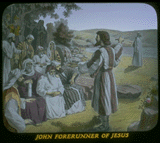
The
work of redemption began with Jesus' consecration to death
at 30 years of age, symbolized by His baptism. There He
who was made flesh for the purpose, gave Himself to be
a Ransom-price for all, to be testified to all in due
time. The humbling of the Logos to take human nature,
the birth of the Babe of Bethlehem, and the years of development
afterward, were incidental. Similarly, the work of John
the Baptiser was a preparation. His mission was the announcement
of Jesus as "the Lamb of God which taketh away the
sin of the world." He reproved sin and exhorted to
righteousness as necessary to all who would receive Messiah
and be received and blessed by Him as sharers in the Kingdom
He would establish.
John
preached, "The Kingdom of Heaven is at hand! Repent
ye!" Only the Israelites indeed, without guile, received
Messiah, and became associates in His glorious work. John's
Baptism was the washing away of sins against the Jewish
Law, and was intended only for Jews not wholly faithful.
John's
Baptism symbolized cleansing from defilement, and was
preached to the Jews, and was applicable to them only.
Gentiles were excluded. How could they repent and get
back into covenant relationship when they had never been
in relationship? The Jews, still under the covenant made
with them at Sinai through its mediator, Moses, had relationship
with God, for, as St. Paul says, they "were all baptized
into Moses, in the sea and in the cloud." Every Israelite
in heart relationship with God through Moses, was transferred
from Moses, to Christ, and needed no additional baptism
into Christ, because already accepted in Moses, the type
of Christ.
When
the call began to go to the Gentiles, several at Ephesus
believed and were baptized by John's Baptism, as though
they had been Jews. This was a mistake. At St. Paul's
word they were rebaptized, into Christ's death. Gentiles
needed to be baptized directly into Christ's death.--Acts
18:25; 19:3-5;Romans 6:3;11:17-25.
The
Baptism of Jesus
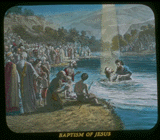
When
Jesus presented Himself to John at Jordan to be baptized,
it caused surprise. John declared, I have more need to
ask You to baptize me! You have no sin to wash away! Jesus
did not explain the matter. He merely said, "Suffer
it to be so now." He thus intimated that He was not
following John's baptism to wash away sins, but that His
baptism had another special meaning, which He did not
disclose. St. Paul explains to us that Jesus' baptism
symbolized His full consecration of His life to God as
a sacrifice, even unto death.--Hebrews 10:5-9.
Jesus
afterward indicated that His entire ministry was a fulfilment
of the consecration made at thirty, when He was baptized.
It symbolized His immersion into death--yielding His life
to the service of God. At the close of His ministry, He
said, "I have a baptism to be baptized with, and
how am I straitened till it be accomplished!" (Luke
12:50.) The next day, on the cross, He cried, "It
is finished!" His baptism into death, begun at Jordan,
was there completed.
In
this matter the followers of Jesus copy Him. They are
baptized into His death, and thus into His Body, the Church.
(Romans 6:3.) This baptism into The Christ company, or
Body, will not be completed until the last member shall
have passed into death. Then the baptism of Christ as
a whole will be finished. Then beyond the veil, by the
First Resurrection, the entire Body will receive glory,
honor and immortality and be joint-heirs with Jesus in
the Kingdom then established. "If we suffer with
Him, we shall also reign."
As
Jesus came up out of the water, the heavens [higher things]
were opened to Him. Heavenly Truths became clearer. He
could understand the "deep things of God." (1
Corinthians 2:10.) This enlightenment came by the receiving
of the Holy Spirit. So His followers received a measure
of the Spirit, begetting them as sons of God, joint-heirs
with Christ. They also are illuminated.--Hebrews 10:32.
Gospel
of the Kingdom
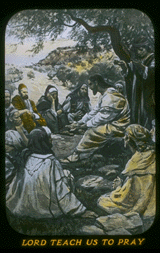
For
more than sixteen centuries Israel had waited and prayed
for the coming of Messiah's Kingdom to exalt them, and
to bless the world. The announcement that the Kingdom
was at hand was a good Message--or Gospel.
But
not enough Jews were in condition of heart to be Israelites
indeed, worthy to share with Jesus in the glorious service
of His great, long-promised Kingdom. "He came unto
His own [people], but His own received Him not"--they
crucified Him. But to as many as received Him [few] He
gave the liberty, or privilege, of becoming sons of God,
of passing from the House of Servants, under Moses, to
the House of Sons, under the Headship of Jesus. This was
effected at Pentecost, by the begetting of the Holy Spirit.--John
1:11-13; Heb. 3:1-6.
Not
enough worthy Jews being found, the Kingdom offer was
withdrawn from them, and for nineteen centuries God has
been completing the foreordained number from saintly Gentiles.
Outward signs and the prophecies demonstrate that the
Kingdom was not set up then, and did not begin to bless
the world. Instead, all the unready of Israel were broken
off from Divine favor for a time, while the Call to the
Kingdom was sent to the Gentiles, to take out of them
a people to complete the foreordained "Body of Christ."
(Romans 11:1-7,11,12.) Holy, saintly characters from every
nation have been gathering for nineteen centuries, until
now the number is nearly complete and the Kingdom about
to be established.
When,
therefore, the election of the Spiritual Seed of Abraham
shall be accomplished, this Gospel Age will end. Then
will begin the Messianic Age, in which Christ and the
Church shall reign in spirit power.--Revelation 5:10;20:6.
Then
the blindness of Israel will be removed, and the blessings
of the New Dispensation will come to them, and through
them to all the families of the Earth, as God promised.
That the Church is the Spiritual Seed of Abraham, to bless
Natural Israel and the world, is clearly shown in Galatians
3:16,29.
Parables
of the Kingdom
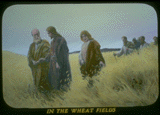
Jesus'
parables chiefly relate to the Kingdom. Some of them show
how the Jews failed to become heirs of the Kingdom, and
how the Gentiles came in for a share. Others show the
Kingdom class suffering violence during this Age as a
part of their preparation for the Kingdom glories. "The
Kingdom of Heaven [class] suffereth violence." The
violent have dominated it by force for centuries.
The
parable of the King's Son shows that the Jews had the
first opportunity for joint-heirship with Messiah in His
Kingdom. Then the Gentiles received the invitation. And
these, not many wise or learned, have for eighteen centuries
been prepared for Messiah's Kingdom. "Do ye not know
that the saints shall judge the world?"--1 Corinthians
6:2.
In
the parable the "Wedding Garment" represents
a faith relationship with God through Christ's merit.
The one who discarded it was cast out of the Bridal Company.
This prefigures the fate of all who reject the efficacy
of the sacrifice of Christ in atonement for their sins.
They will be forced out of the light of Present Truth--into
the "outer darkness" of the world. By and by
they will realize their loss of the Kingdom with chagrin--weeping
and gnashing of teeth.
The
Pearl of Great Price illustrates the Kingdom's priceless
value--it is worth its cost--our all.
The
Wheat-field parable of the Kingdom represents the Church
during this Age. The wheat, almost choked out by tares
of error, yet finally ripened and gathered into the Heavenly
garner, will be the Sun of Righteousness to usher in the
New Day of Messiah's Kingdom.--Matthew 13:43.
The
parable of the Talents represents how each consecrated
disciple of Jesus is a steward of his own talents, and
that according to his faithfulness will be his share in
the Kingdom. Faithfulness in using the few talents of
the present will bring great opportunities for blessing
the world in the next Age. "I will make thee ruler
over many things."--Matthew 25:21.
The
Prodigal Son
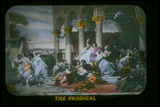
The
Scribes, Pharisees and Doctors of the Law were the Elder
Brother of the Prodigal Son parable. Publicans and sinners,
careless of spiritual privileges, were the Prodigal, estranged
from their Father's House. Jesus shows God's attitude
toward the returning prodigal. For such He provides a
"feast," a blessing which all may share, if
they will. Those who received Jesus' Message included
not many great, wise or noble, but chiefly penitent prodigals.
The
parable of Dives and Lazarus illustrated the same lesson.
The Jewish nation was Dives, the Rich man. His table,
his spiritual food, the promises of God, was abundantly
supplied; his raiment, fine linen, represented justification,
effected through the typical Atonement-day sacrifices.
His purple robe represented, symbolically, the fact that
he was identified with God's Kingdom, purple being a symbol
of royalty. Lazarus represented the hopelessness of the
sinners and Gentiles, who hungered for a share in the
promises to Abraham, but who got only "crumbs"
until Israel's rejection.--Matthew 23:38.
The
Poor man's sores represented a sin-sick condition; the
dogs which licked them represented the sympathy of Gentile
"dogs." This was illustrated in the Syrophenician
woman whose daughter Jesus healed. She was not a Jewess,
and therefore Jesus at first refused to aid her, saying,
"It is not proper to take the children's bread and
give it to dogs." But she pleaded: "Yes, Lord,
yet the dogs eat of the crumbs that fall from the children's
table." Jesus gave her the crumb.
The
Rich man, the Jewish nation, died to his great blessings.
Nationally he fell asleep in Hades, and awaits reawakening.
But personally the Jews passed into a great time of trouble,
symbolically represented as fire, for eighteen centuries.
Lazarus
also died to his condition of disfavor, and found himself
in "Abraham's bosom"--a child of Abraham. Thus
the Gentiles have become Abraham's Seed, and heirs of
the Spiritual part of the Abrahamic Promise.--Galatians
3:29.
|
